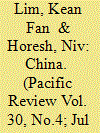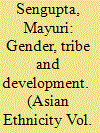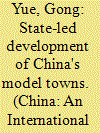|
|
|
Sort Order |
|
|
|
Items / Page
|
|
|
|
|
|
|
| Srl | Item |
| 1 |
ID:
153240


|
|
|
|
|
| Summary/Abstract |
The political-economic evolution of post-Mao China has been portrayed as a historically inevitable embrace of neoliberalism; as an exemplification of the East Asian developmental state and as an extension of Soviet New Economic Policy-style state capitalism. This paper evaluates these portrayals through a broad historical and geographical framework. It examines the position of China as a new state after 1949. It then places the shifting logics of socioeconomic regulation in China in relation to (1) the global neoliberal hegemony since the 1980s and (2) the concomitant shifts in the economic policies of Japan, South Korea and Taiwan. In so doing, the paper demonstrates how the Communist Party of China creatively adapted and re-purposed regulatory logics from the Washington Consensus and East Asian policies to consolidate its own version of Leninist state-led development.
|
|
|
|
|
|
|
|
|
|
|
|
|
|
|
|
| 2 |
ID:
157952


|
|
|
|
|
| Summary/Abstract |
The article critically examines the gendered impacts of state-led development among the Reang tribal community in Tripura (Northeast India) and outlines causes of gender-based inequalities that affect Reang women’s ability to engage in livelihood, achieve financial independence and participate in political affairs of the state. The article outlines two interlinked arguments. First, gender-based inequalities are not adequately addressed by the postcolonial Indian state which tends to homogenise members of tribal communities through development policies by privileging ethnicity over gender. Second, gender-based inequalities are also not adequately addressed within the Reang community highlighting complex intra-tribal dynamics wherein differential notion of inequalities among the Reangs and position of certain influential actors within the community determines which issues are addressed and which are marginalised.
|
|
|
|
|
|
|
|
|
|
|
|
|
|
|
|
| 3 |
ID:
101269


|
|
|
|
|
| Publication |
2010.
|
| Summary/Abstract |
This article argues that a protracted conflict, in general, has strengthened the state vis-à-vis the society in Egypt, Israel, South Korea, Syria and Taiwan. Yet, the existentially threatened states, namely, Israel, South Korea and Taiwan, have pursued economic development and industrialization as a strategic objective. While all three states have been strategically important for the hegemon, the United States, the latter has encouraged them to adopt an export-oriented strategy and opened its own market to their exports. Given the rise in state strength, an existentially threatened state becomes more capable of extracting taxes and mobilizing the society for industrialization. Both Egypt and Syria, in contrast, were merely engaged in a protracted conflict. Consequently, they were not under pressure to maximize their power through industrialization and/or export-led growth strategy, and each explored, in its own unique way, short-cut solutions for regaining its occupied territory.
|
|
|
|
|
|
|
|
|
|
|
|
|
|
|
|
| 4 |
ID:
163119


|
|
|
|
|
| Summary/Abstract |
Town development significantly drove China's rural industrialisation and urbanisation forward during the 1980s and 1990s. This article examines the state-led development of model towns since the early 2000s. A case study of Guangdong province demonstrates that all levels of the government administration system have been involved in the establishment of model towns, forming a state-led development framework from "above". As is evident in the state-led framework, prefectural and county governments control the development even though the central and provincial governments have established major development programmes and organised local governments to implement them. Government interactions have therefore resulted in diverse development paths with varying effects among regions. While state-led development has involved industrialists as a crucial force, it has largely excluded forces from "below", such as village collectives and rural migrants.
|
|
|
|
|
|
|
|
|
|
|
|
|
|
|
|
|
|
|
|
|